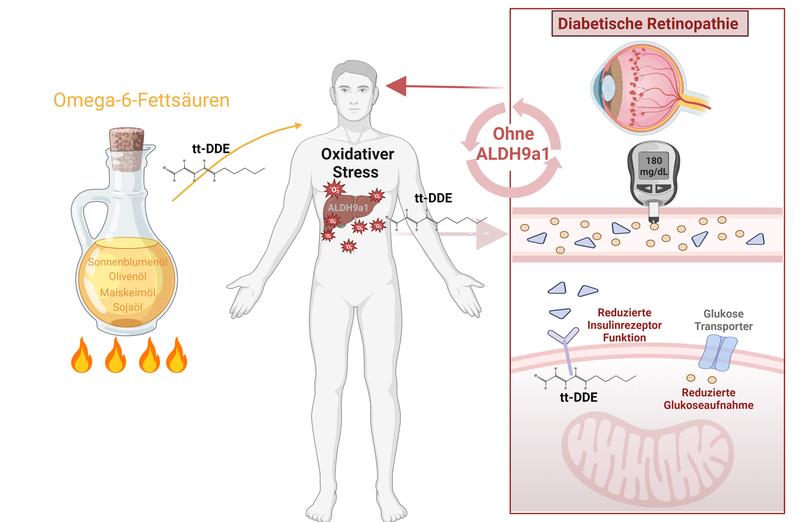Under the leadership of Professor Dr. Jens Kroll from the European Center for Angioscience (ECAS) at the Mannheim Medical Faculty of the Heidelberg University, the researchers tracked down a degradation product of omega-6 fatty acids and developed a model in zebrafish in which they can investigate the undesirable effects of this oxidation product called tt-DDE (for trans,trans-2,4-decadienal).
It is commonly believed that omega fatty acids are healthy, but this belief is shaky. Epidemiological studies and a so-called Red Hand Letter, in which eight pharmaceutical companies provide information about the risks associated with omega-3 fatty acids (source: BfArM, 16.11.2023), indicate that the issue is more complex than expected.
Like omega-3 fatty acids, omega-6 fatty acids are polyunsaturated fatty acids. And like these, they have various functions in the body and must be supplied to the organism through food. The role of omega-6 fatty acids in relation to cardiovascular disease is contradictory. On the one hand, omega-6 fatty acids presumably reduce the risk of developing cardiovascular diseases such as heart attacks or strokes by positively influencing fat levels and blood pressure. However, too many of these essential fatty acids are suspected of inducing early stages of vascular calcification through their pro-inflammatory effect, which in turn favours cardiovascular diseases.
Professor Kroll's research group at the Mannheim Medical Faculty of Heidelberg University, together with scientists from Heidelberg University Hospital (UKHD), the University of Frankfurt and Zhejiang University Hangzhou, China, approached the topic from a new angle by investigating the oxidation product tt-DDE, which is also abundant in cooking oil vapours. In order to understand what increased tt-DDE levels can do, they first had to find out which enzyme breaks down tt-DDE. They discovered that aldehyde dehydrogenase 9a1b performs this task: if this enzyme is switched off, tt-DDE levels rise.
With this information, the scientists were able to develop a model in zebrafish that could be used to investigate the effects of high tt-DDE levels. They found that an increased tt-DDE level is associated with a disturbance in sugar metabolism - comparable to mild diabetes - as well as a disturbance in the function and formation of blood vessels, which is also typical of diabetes.
The researchers also discovered the mechanism: they were able to prove that tt-DDE inhibits the function of the insulin receptor by binding to it. The blood sugar-lowering effect of insulin, which in a healthy organism activates the transport of glucose from the blood into the cell, among other things, is thus unable to unfold and is presumably responsible for the hyperglycaemia observed in the blood.
Professor Kroll says: "We discovered a new function of aldehyde dehydrogenase 9a1b while investigating a degradation product of omega-6 fatty acids. As the enzyme regulates the level of tt-DDE, it is also an important regulator of glucose metabolism and could be an important component in the development of diabetes. We now want to investigate whether there is a subgroup of diabetics who develop secondary damage due to excessive tt-DDE levels - either because tt-DDE degradation is too low or tt-DDE accumulation due to oxidation of omega-6 fatty acids is too high."
This raises an important question that the scientists also want to investigate: Are there people with mild diabetes caused by a disorder of aldehyde dehydrogenase 9a1 function - and could aldehyde dehydrogenase 9a1 be the key to a new therapy?
With this work, Professor Kroll's research group has achieved an important milestone in understanding how oxidation products of omega-6 fatty acids influence metabolism, which may also shed some light on the somewhat more complex effects of omega fatty acids.
Original publication: Impaired Detoxification of Trans, Trans-2,4-Decadienal, an Oxidation Product from Omega-6 Fatty Acids, Alters Insulin Signaling, Gluconeogenesis and Promotes Microvascular Disease (Qian et al., 2023)
Scientific Contact:
Prof. Dr. Jens Kroll (jens.kroll(at)medma.uni-heidelberg.de), Dept. of Vascular Biology & Tumor Angiogenesis, Medical Faculty Mannheim, Heidelberg University
Source: idw press release (in German only)


